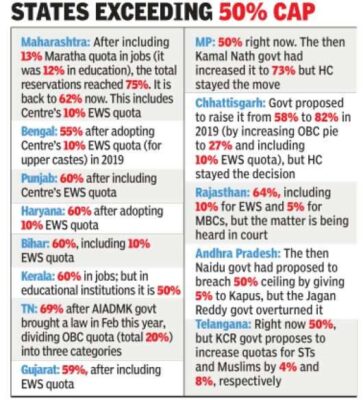- Home
- Prelims
- Mains
- Current Affairs
- Study Materials
- Test Series
 EDITORIALS & ARTICLES
EDITORIALS & ARTICLES
Quantifiable data is essential for quota
The Madras High Court’s recent verdict of quashing the 10.5% special reservation for Vanniyakula Kshatriyas within the overall 20% quota for Most Backward Classes (MBC) and Denotified Communities (DNC) has again highlighted the importance of quantifiable data as a prerequisite for reservation in education and employment.
In 2020, the Tamil Nadu government passed the special quota law which was challenged before the High Court, which held it unconstitutional for a host of reasons.
Even though the Court described the submission that the law was enacted only on the basis of “adequate authenticated data on population” of the MBCs and DNCs enumerated by the second Backward Classes (BC) Commission as the “main thrust” of arguments of Tamil Nadu’s Advocate General, it concluded that “there is no data, much less quantifiable data, available with the State government before the introduction” of the law.
In this context there is a need to relook into the nuances of reservation and lack of existing data.
Need For Reservation
 Issues
Issues

- To correct the historical injustice faced by backward castes in the country.
- To provide a level playing field for backward sections as they can not compete with those who have had the access of resources and means for centuries.
- To ensure adequate representation of backward classes in the services under the State.
- For advancement of backward classes.
- To ensure equality as the basis of meritocracy i.e all people must be brought to the same level before judging them on the basis of merit.
- It ensures diversity in advanced education, equality in the workplace and offers protection from hatred.
- It helps in the emancipation of disadvantaged individuals and thereby promotes equality for all.
- It breaks stereotypes regarding caste, religion, and ethnicity.
- It increases social mobility.
- It is needed to compensate for centuries of oppression and discrimination and provides level-playing fields.
- It seeks to bring equity in society by addressing 'graded inequalities'.
- There are concerns that lead to erosion of meritocracy.
- It can still reinforce stereotypes as it demeans the achievements of marginalized sections.
- People coming under the ambit of reservation, their success is labelled as a result of Reservation, instead of their capabilities and hard work.
- There are concerns that reservation can serve as a medium for reverse discrimination.
- Reverse discrimination is discrimination against members of a dominant or majority group, in favour of members of a minority or historically disadvantaged group.
- Due to vote bank politics, even after discrimination issues have been diminishing, it is difficult to withdraw the reservation.
 Issues
Issues
- No Exhaustive Study: It is a fact that no exhaustive study has been done to collect quantifiable data on the representation of different communities in education and employment since the second BC Commission(Tamil Nadu), popularly known after its chairman, J.A. Ambasankar, carried out one during its existence (1982-1985).
- Internal Reservation: The need for internal reservation has been felt for more than one reason. It has been found certain sections of the communities are more backward than others.
- The situation has got compounded in the absence of application of the creamy layer rule in reservation.

- Reviewing the 1992 Judgement: The Supreme Court shall go a step further and look into the Indra Sawhney case to clear the issues that have arised due to various judgements given by the high courts.
- The reservation facility should be aimed at improving the socio-economic conditions of the marginalised in keeping with their standing in the caste-based census.
- Maintaining the Federal Structure: While deciding the reservation issue, it is also important to take into account whether the states providing reservations to different communities are maintaining the federal structure of the government or destroying it.
- Under Article 341 and Article 342, declaring a particular community as Scheduled Caste (SC) or Scheduled Tribe (ST) is the power that vests in parliament.
- Balancing the Reservation and Merit: While giving reservation to the communities, the efficiency of the administration has to be looked upon too.
- Reservation beyond the limit will lead to the ignorance of the merit, which will disturb the entire administration.
- The sole purpose of reservation is to address the issue of historical wrong done to the less-advantaged communities but the merit beyond a certain point must not be neglected too.
- A strong political will is indispensable to find an equilibrium between justice to the backwards, equity for the forwards and efficiency for the entire system.









 Latest News
Latest News General Studies
General Studies